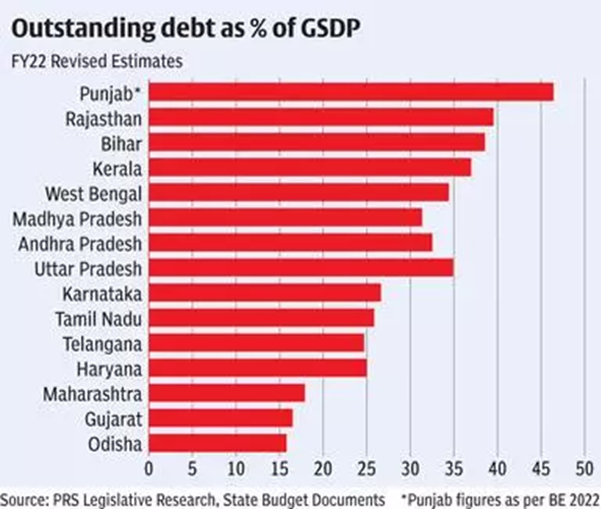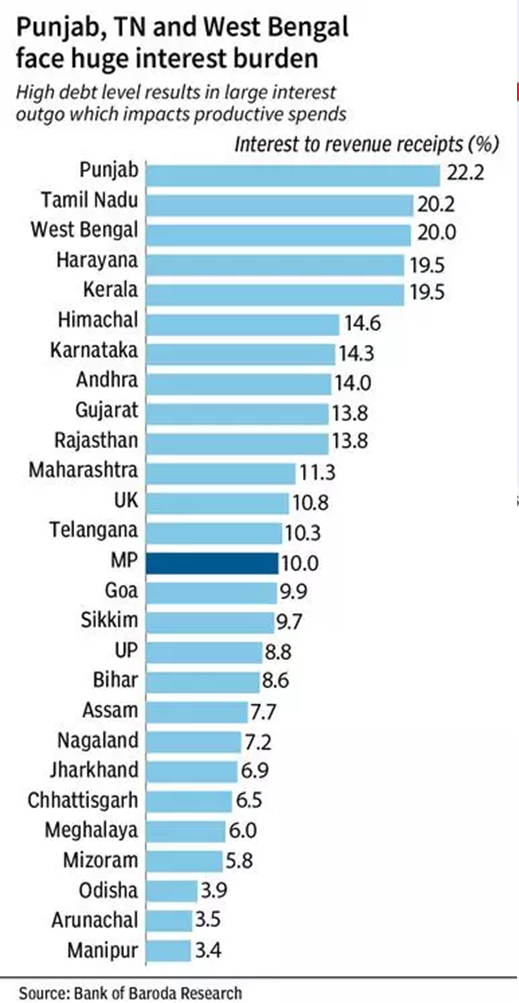ODISHA SHOULD DESIST FROM FISCAL LARGESSE
Relevance: GS 2 – Government policies and interventions for development in various sectors and issues arising out of their design and implementation.
Why in the News?
- The Biju Janata Dal government in Odisha is distributing freebies rapidly in anticipation of the elections, ranging from uniforms to jute bags.
- In a recent state cabinet meeting, approval was granted for providing Rs 1,000 to each of the 70 lakh members of women self-help groups (SHGs) for purchasing uniforms.
- Additionally, approximately5 lakh executive members of these groups will receive Rs 2,000 each to procure blazers.
Government’s Focus on Women SHGs
Women SHGs are a crucial demographic for the Naveen Patnaik government, currently seeking its sixth consecutive term. The government’s initiatives extend beyond SHGs, with recent announcements targeting a broader population.
- Loan Scheme for SHG Members:
- The government introduced a loan scheme in 2023 for SHG members aimed at facilitating the purchase of scooters.
- The scheme included a provision of Rs 528 crore to cover interest subvention costs.
- One-time Cash Assistance and Jute Bags for Ration-card-holding Families:
- Recently, the government unveiled a one-time cash assistance program, offering Rs 1,000 to each family holding a ration card to combat rising prices of essential goods.
- Additionally, each of the 6 lakh eligible families, totaling 3.35 crore individuals, will receive two jute bags for collecting food from fair price outlets.
- The provision of these jute bags will incur a cost of Rs 278 crore.
The announcement of schemes totaling Rs 2,000 crore within a single week has sparked criticism from opposition parties and economic analysts.
Contrasting Views on Government Freebies:
Critique of Freebies:
- They argue that freebies are primarily aimed at appeasing specific constituents rather than focusing on sound economic policies.
- They contend that the government frequently introduces schemes, both new and recycled, nearing elections, suggesting a pattern of using freebies as a political tool.
- Despite variations in the packaging, the essence of the freebies remains consistent over time.
Support for Freebies:
- Conversely, others argue that the government’s healthy fiscal position enables it to provide such incentives.
- This viewpoint suggests that the availability of resources allows for the distribution of welfare measures without compromising the state’s financial stability.
The Case of Odisha
- Odisha, boasting a surplus in revenue, holds one of the lowest loan payment obligations among states.
- Its capital formation, relative to the state GDP, ranks among the highest, facilitating the funding of capital expenditure.
- The state benefits from robust mining revenues and GST earnings, providing a cushion to finance populist schemes.
- Given its favorable fiscal position, there’s widespread support for such initiatives.
- However, there’s consensus that Odisha should avoid following the paths of Karnataka and Rajasthan, where successive administrations have struggled to break free from detrimental cycles.
- It’s crucial for Odisha to safeguard its hard-earned fiscal advantage and refrain from sacrificing long-term stability for short-term gains.
Advantages of Freebies:
- Public Outreach and Engagement: Government freebies enhance public trust and satisfaction by showcasing responsiveness to citizens.
- They foster dialogue, transparency, and democracy, as seen in Uttar Pradesh and Tamil Nadu.
- Economic Growth: Freebies like laptops and bicycles boost workforce productivity, particularly in less developed regions.
- Initiatives such as providing bicycles in Bihar and West Bengal improve education outcomes and enrolment rates.
- Social Welfare: Freebies address basic needs like food, education, and health for marginalized groups.
- Programs like food subsidies and health insurance reduce poverty and improve quality of life.
- Income Equality: Freebies redistribute wealth, reducing income inequality and poverty.
- Loan waivers and cash transfers empower low-income households, as evidenced by improved creditworthiness among distressed farmers.
Disadvantages of Freebies
- Dependency Syndrome: Freebies may foster a sense of entitlement and dependency among recipients, discouraging motivation to work or pay taxes.
- In Tamil Nadu, 41% of voters considered freebies crucial in voting, indicating potential dependency issues.
- Fiscal Burden: Freebies can strain fiscal health, leading to increased public expenditure, deficits, and debts.
- Schemes like farm loan waivers or pension programs pose fiscal risks, impacting the government’s ability to invest in crucial sectors.
- Resource Misallocation: Allocation of resources may be distorted, diverting funds from essential sectors like infrastructure and agriculture.
- Initiatives like distributing laptops in Uttar Pradesh were criticized for diverting funds from urgent needs like improving school infrastructure.
- Quality Compromise: Freebies may compromise the quality and competitiveness of goods and services, reducing incentives for innovation.
- Instances where free laptops were based on obsolete technology limited functionality and performance.
- Impact on Environment: Freebies can lead to overuse and wastage of natural resources, adversely affecting the environment.
- Examples include free power for farmers in Punjab, causing overuse, low tax compliance, and poor service delivery by the state power utility.
The Way Forward
- Drawing a Line Between Welfare and Freebie: Freebies should be economically justified and connected to taxpayers’ money, distinguishing them from subsidies which serve specific needs.
- Clear Rationale and Indication of Funds: Political parties must disclose the financing, fiscal impact, and trade-offs of freebies to voters and the Election Commission of India (ECI) before announcing them.
- Empower the Election Commission of India: The ECI should have enhanced regulatory powers to monitor and regulate the announcement and implementation of freebies during elections.
- Voter Awareness: Educating voters about the consequences of freebies and encouraging them to demand accountability from political parties through awareness campaigns and literacy programs.
- Judicial Intervention: Judicial involvement, as suggested by the Supreme Court, can propose measures to control the proliferation of freebies during election campaigns.
- Focus on Inclusive Development: Addressing root causes of poverty and inequality through inclusive development strategies can provide a sustainable alternative to freebies, fostering long-term economic growth and social progress.
Source: https://www.newindianexpress.com/editorials/2024/Feb/19/odisha-should-desist-from-fiscal-largesse
Mains question
In the context of Odisha’s fiscal policies, discuss the impact of populist schemes on its economic stability. Evaluate the need for caution, drawing comparisons with other states facing similar challenges. (250 words)





